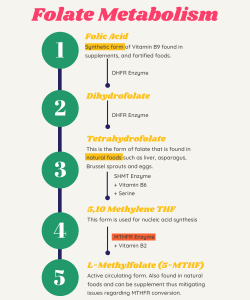HEALTH TOPICS
Folic Acid vs. Folate: Which One to Use, Benefits and Everything in Between.
Posted by: Quieta Bail Naturopath (BHSc)
Folate
Folate is a water-soluble, naturally found vitamin also known as Vitamin B9, whereas folic acid is it’s synthetic version. It has many roles within the body including forming DNA and RNA, and metabolising protein. It also helps to break down homocysteine, produce healthy blood cells and is a critical nutrient during pregnancy and foetal development. Folate generally comes in a tetrahydrofolate (THF) form and has additional glutamate residues, making them polyglutamates. Low levels are associated with elevated homocysteine, which is associated with heart disease and stroke. Furthermore, deficiency increases risk of birth defects and cancer risk.
Folate is naturally found in foods such as beef liver, dark leafy greens, eggs, meat, and poultry. Vegetable options include spinach, asparagus, and Brussel sprouts. Foods such as grains are often fortified with a synthetic version of folate, folic acid, which we will discuss after. The recommended daily intake of folate is 400mcg for males and females above 14 years of age. During pregnancy though, this requirement goes up to 600mcg. To put this in perspective, 1 cup of boiled spinach is roughly 262 mcg, or 85 grams of beef liver is equal to 215mcg. The maximum you should consume a day is 1000 mcg.
Folic Acid
Folic acid is the synthetic form of folate (vitamin B9), also known as pteroylmonoglutamic acid. It is the fully oxidised monoglutamate form of the vitamin. This is the most used form in fortified foods and supplements. Folic acid has a high absorption rate for the general population.
Absorption & MTHFR Genes
For dietary folate and folic acid to be used in your body it goes through a series of enzymatic conversions. For folic acid, first, it is converted to dihydrofolate, then tetrahydrofolate (THF – this is where the food version starts), then 5,10 Methylene THFR. After this, the MTHFR gene converts it to L-Methylfolate (5-MTHF).
More than 1 in 3 people have difficulty utilising folate and folic acid in their body. This is due to a genetic variation known as the MTHFR gene. This basically hinders the last step in converting it to a usable form (5-MTHF). This deficiency reduces enzyme activity by up to 70% of the final stage which converts folate into it’s active form which the body can utilise. This basically makes folic acid supplementation ‘pointless’ for one third of the population, but it also can hinder general dietary absorption as well. This is why even without MTHFR Gene mutation it’s important to supplement with an activated form of folate (i.e. 5-MTHF). Other conditions that may impact absorption include alcoholism, intestinal surgeries, and digestive disorders (i.e. celiac disease).
Concerns with Folic Acid
So, if the MTHFR gene effects both dietary and folic acid absorption, what’s the issue with folic acid? If people do have issues with this final enzymatic stage of converting folic acid to 5-MTHF, what’s left is unmetabolised folic acid. This can be caused by excessive supplementation as well as fortification found within foods. People with the MTHFR gene are of particular risk, as almost 70% of folic acid consumed will not be metabolised. Several studies have indicated that chronically elevated levels of unmetabolised folic acid can have adverse health effects, such as:
- Increased cancer risk: High levels of unmetabolised folic acid have been associated with increased cancer risk. Currently there is no direct evidence of how it plays a role. Although, unmetabolised folic acid has shown to reduce numbers of natural killer cells, which has anti-tumour activities.
- Undetected Vitamin B12 deficiency: Folate can correct B12 deficiency, but not the underlying neurological damage caused by B12 deficiency. Therefore, high intakes of synthetic folic may mask the deficiency until the consequences are severe. This has been thought to be a possible cause of cognitive impairment among elderly people.
Research has found that unmetabolised folic acid appears in the bloodstreams of children, adolescents, adults, breastmilk, and umbilical cord blood of newborn children. A couple of studies found that even single folic acid doses of 300-400mcg, a regular amount found in supplements or fortified foods, results in detectable levels of unmetabolised folic acid.
What can you do?
Unmetabolised folic acid is a concern, although, the health implications are unclear in current research. If you don’t have issues with absorption, and you are consuming within the correct dosage, folic acid may be fine for you. Nonetheless, to reduce your risk of any health consequences caused by unabsorbed folic acid, it is best to stick to sourcing your folate from whole (unfortified) foods.
If supplementing, which may be necessary due to increased requirements (i.e. pregnancy), ensure that it contains an activated form of folate. This way your body can utilise the folate and reduce risk of build-up of unmetabolised folic acid. If you have MTHFR Gene mutations, it will be necessary for you to supplement with an activated form of Folate (5-MTHF). It’s important to note that most over-the-counter preconception products, including arguably the most popular, Elevit, use the inactivated folic acid.
Why it’s worth getting a good pre-natal supplement
Folate is one of the most discussed nutrients when it comes to supporting a healthy conception and pregnancy. This is because it is a key nutrient for the development of the child’s neural tube! When pregnant, your requirements for folate increase, and although diet can help to bear this extra requirement, you may want to consider supplementation. This is especially true if you have underlying conditions that reduce absorption of certain nutrients, such as coeliac’s disease or MTHFR gene mutations.
Considering an estimated 1 in 3 women have issues absorbing folic acid, it’s best to find a supplement that has an activated form of folate, so you don’t have to be concerned that it isn’t being absorbed. Ensuring adequate intake of folate is extremely important for pregnancy as it has been widely studied for preventing neural tube defects and therefore supporting healthy brain development of your child.
Besides folate, ensuring your prenatal has other adequate nutrients for healthy brain development should be considered. For example, choline is an imperative nutrient for brain and neural tube development. Products such as Elevit do not contain this nutrient nor adequate amounts/bioavailable forms of other key nutrients.
Naturopaths Pick: Prenatal Supplements 
As a qualified naturopath, I can support you through all stages of pregnancy and preconception. As discussed above, everyone has different genes and underlying conditions which may affect their nutrient absorption. A personalised approach can be extremely supportive in healthy conception. My top pre-natal suggestions are:
- Naturobest Preconception Multi: My go-to over-the-counter preconception multivitamin. With clinical formulation and dosages, it provides active forms of folate as well as other B vitamins, nutrients and minerals required for a healthy preconception. Continue with the rest of their range of Trimester 1, Trimester 2 & 3 once conception has occurred.
- MTHFR Group Prenatal Methyl: Specifically formulated for those with MTHFR gene mutations, this prenatal multivitamin can be taken by men and women for preconception and pregnancy. It contains the biologically active form of folate, 5-MTHF, as well as ideal daily doses of 26 other important nutrients for mother and baby including choline and iodine. Can be taken in conjunction with MTHFR Group B9 Drops
- Herbs of Gold Activated Folate 500: For those just wishing to have adequate folate, this formula contains the 5-MTHF metabolically active form of folate. This will be particularly useful for general maintenance and those with low activity of the MTHFR enzyme.
Final Remarks
When considering a folate supplement, it may be first important to discuss current dietary intake and actual requirement for a supplement. If unsure of whether you have underlying conditions that could hinder absorption, such as coeliac disease and MTHFR gene mutation, you may want to investigate this. Overall, when opting for supplementation, it is safest to go for an activated form of folate such as 5-MTHF, to ensure that your body can utilise it and you’re not wasting your money.
Folate has many benefits, especially for pregnancy. Investing in a great pre-natal supplement is well worth it for the health of you and your child.
References
https://www.hsph.harvard.edu/nutritionsource/folic-acid/
https://ods.od.nih.gov/factsheets/Folate-HealthProfessional/
https://pubmed.ncbi.nlm.nih.gov/16365081/
https://pubmed.ncbi.nlm.nih.gov/28724658/
https://pubmed.ncbi.nlm.nih.gov/17378936/
https://pubmed.ncbi.nlm.nih.gov/9174474/
https://pubmed.ncbi.nlm.nih.gov/11971038/
https://pubmed.ncbi.nlm.nih.gov/25788000/
https://www.nature.com/articles/ni1582
https://www.healthline.com/health/mthfr-gene#variants
https://www.healthline.com/nutrition/folic-acid-vs-folate
Subscribe to Gr8Health
Sign up to get 5% off your first order, exclusive access to our special offers, new arrivals and more.